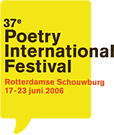Poet
|
Leonard Nolens 1947-... country: Belgium language: Dutch |
is one of the most acclaimed Flemish poets today. In his melodious, personal, expressive poetry, language creates harsh confrontations. Among the awards he has received for his work are the Jan Campert Prize in 1991 and the triennial State Prize for Poetry in 1992. Leonard Nolens (1947) is a monumental figure in Flemish and Dutch-language poetry. He convinces as a poet by the sweeping, compelling quality of his work, as much as by the inspired nature of his poetic calling and the uncompromising inevitability of his texts. He seems possessed with what could be described as the ‘furor poeticus’, which places him in a long romantic poetic tradition. Typical Nolensian themes are youth, women, loneliness, and alcohol. Yet, although on his way through life he keeps sinking his teeth into his own passions and preoccupations, it’s the art of poetry which prevails over the vicissitudes of personal life. In other words, poetry for him provides the medicine, the balm to the wounds of existence. One of his collections bears the title Manieren van leven (Ways of Life), an apt description, as each of his poems to him means a way of life. In his work one often senses a violent urge towards living life to the full, experiencing its highs and even more its lows. However drab and hopeless life may seem, the cosmos will always be in need of man. This sums up Leonard Nolens’ outspoken anthropocentric outlook. It is not about higher powers or rational insights, but about man in his naked, uncivilized state. In collection after collection, this poet has been trying, not to enrich life, or say something new about it, but to ritualize it instead. It is in poetry that he proves himself to be alive. In this effort Nolens continues the ancient practice of shamanism, each of his poems being a new prayer for rain. From the reader he also expects unconditional dedication: ‘So read me. Read all of me or don’t read me at all,’ he once wrote. In the course of decades, Nolens has grown to become one of Flanders’ most impressive poets. Despite the increased lightness and rationality of modern Flemish poetry, he has remained true to his melancholy roots. He has received several awards, including the prestigious Constantijn Huygens Prize for his entire oeuvre, in 1997. Author: Rob Schouten Translated by Ko Kooman Orpheushanden (1969); Twee vormen van zwijgen (1975); Alle tijd van de wereld (1979); De gedroomde figuur (1986); Geboortebewijs (1988); Tweedracht (1992); Honing en as (1994); En verdwijn met mate (1996); Voorbijganger (1999); Manieren van leven (2001). Poets: |


